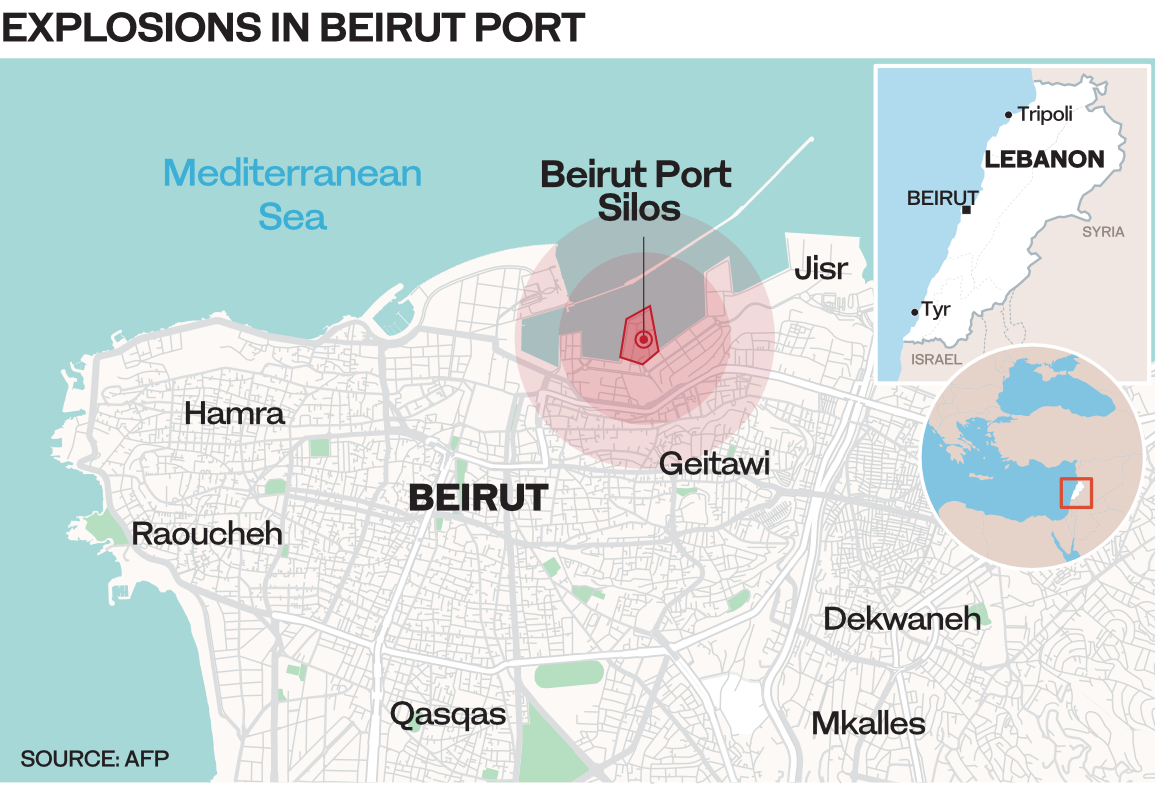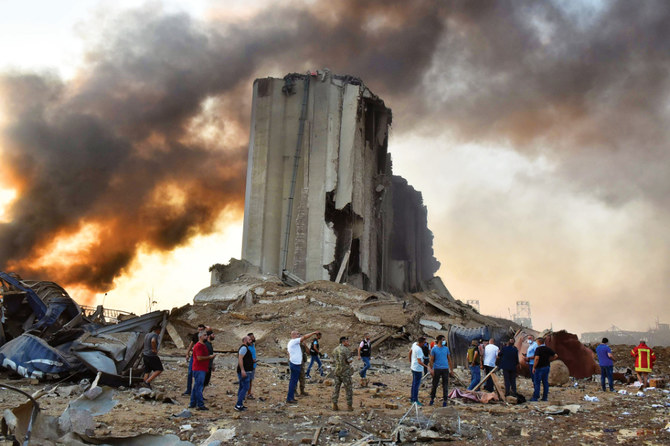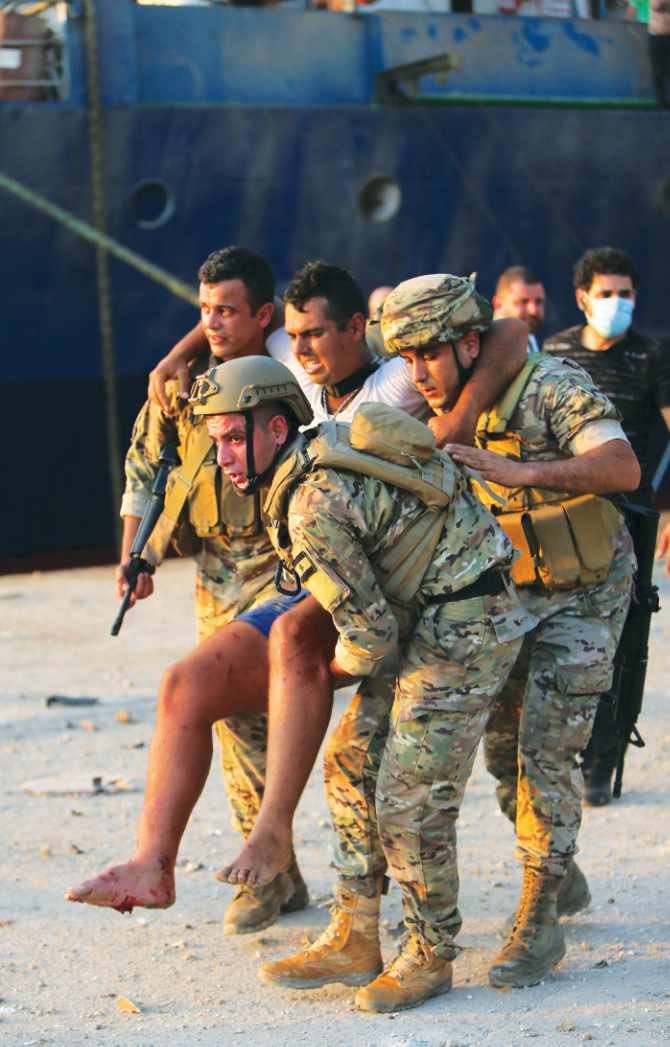BEIRUT: Lebanon’s prime minister made a desperate plea for international help after twin explosions devastated Beirut and plunged his country deeper into crisis.
The two massive blasts killed at least 73 people, injured more than 3,700, and destroyed and damaged buildings across the capital.
While the cause of the blasts remains unclear, Lebanese leader Hassan Diab vowed that those responsible would be punished.
“What happened today will not pass without accountability,” he said in a televised address. “Those responsible for this catastrophe will pay the price.”
With the country already trapped in a crippling economic crisis and battling COVID-19, Diab appealed for international assistance.
“I am sending an urgent appeal to all countries that are friends and brothers and love Lebanon, to stand by its side and help us treat these deep wounds,” he said.
The explosions took place at a warehouse in the city’s port shortly after 6 p.m.

Lebanon’s internal security chief Abbas Ibrahim said the blasts occurred in a section of the port housing highly explosive materials that had been confiscated and stored there for years.
Diab said that the “dangerous warehouse” had been there since 2014.
Even in a city with a history of conflict, the scale of the explosions was unprecedented. The blasts were so strong the they were felt in Cyprus, 200 km away.
Videos showed an initial explosion and fire, followed by a massive blast and shockwave spreading through the city’s buildings. People could be heard screaming and running for cover in restaurants and from balconies. Many thought they had been hit by an earthquake.
INTERNATIONAL REACTIONS
- "The Kingdom expresses its sincere condolences to the families of the victims and the injured." - Saudi Arabian Ministry of Foreign Affair
- "We stand ready to assist the people of Lebanon as they recover from this horrible tragedy." - Mike Pompeo, US Secretary of State
- "I express my fraternal solidarity with the Lebanese. France stands with Lebanon. Always." - French President Emmanuel Macron (tweeted in Arabic).
- "The United States stands ready to assist Lebanon. We will be there to help." - US President Donald Trump
- "Our prayers are with our Lebanese brothers and sisters." - Sheikh Mohammed bin Zayed, Abu Dhabi Crown Prince
- "My sincere condolences and sympathies to our brothers in Lebanon." - Egypt President Abdel Fattah El-Sisi
- "We share the pain of the Lebanese people and reach out to offer our aid." - Israeli President Reuven Rivlin
“It was like a nuclear explosion,” Walid Abdo, a 43-year-old school teacher in the neighborhood of Gemayzeh, told AP.
Bloodied residents poured into the city’s streets as emergency teams rushed to the scene. Ambulances from across the country headed to the capital to help treat the injured.
Buildings across the entire city were damaged, with windows blown out and ceilings collapsed.
By nightfall the injured were flooding the city’s hospitals, with many being seen by medics on the pavements outside.
Health Minister Hassan Hamad said the hospitals were barely coping, and offers of aid were pouring in from Arab states and friends of Lebanon. Lebanese Red Cross official Georges Kettaneh said the injured were being taken to hospitals outside the capital because facilities there were full.
As speculation mounted over what had caused the explosions, an Israeli official said his country, which has fought several wars with Lebanon, had nothing to do with the blasts.
The explosions took place just days before a UN tribunal was due to deliver verdicts against four men accused of killing the former prime minister Rafik Hariri and 21 others in a 2005 bombing that shook the region. The suspects are members of Hezbollah, the Iran-backed militant group that has since increased its role in the country’s government as well as conflicts across the region.
Rafik’s son Saad, also a former prime minister, said the explosions had left Beirut “crying.”
“Everyone is being called to rescue (the country) and (provide) solidarity with our people,” he said. “The magnitude of the losses is too great to be described”
Prime Minister Diab declared a day of mourning on Wednesday, while President Michel Aoun called for an emergency meeting of the Supreme Defence Council, which declared Beirut a disaster-stricken city.
Across Lebanon and among the country’s widespread diaspora, Lebanese were left in shock at the latest tragedy to befall their homeland. Many scrambled to contact relatives and friends.
Lebanese musician Jad Choueiri said the scenes near his home in the Achrafieh neighborhood “looked like the apocalypse.”
He posted an image of his apartment windows blasted across his living room. “I could have died,” he said. “Blood is everywhere on the streets.”
Lebanese journalist Rima Maktabi tearfully described the damage to her home. “My house is gone I think,” she told Al Arabiya, the channel where she works.
Raja Farah, a pastry chef, said he was just half a kilometer from the blasts.
“It is impossible to explain the magnitude of this explosion. I was about as far from the Hariri blast a few years ago, and this was 100 times more powerful,” he said.
Across the city shocked workers and businesses owners poured into the streets.
A video from inside the offices of the Daily Star newspaper showed scenes of devastation, with computers strewn across the floor and ceilings collapsed.
The foyers of the city’s most famous hotels — the Four Seasons and the InterContinental Phoenicia Beirut — were strewn with broken glass.
At the scene of the blast, fire crews battled the blaze into the evening. Helicopters dumped water on flattened buildings as a ship in the port remained on fire.
Beirut’s tearful governor Marwan Abboud toured the site, saying: “Beirut is a devastated city.”
As the scale of the tragedy unfolded, foreign governments, both in the Arab world and beyond, offered their support.
Saudi Arabia said it was following the tragedy with great concern and affirmed the Kingdom’s support and solidarity with the Lebanese people. The UAE’s Crown Prince Sheikh Mohammed bin Zayed said: “We pray that God grants you patience and solace. God bless Lebanon and the Lebanese people.”
Similar offers of support were sent from Bahrain, Kuwait, Egypt and Jordan. Israel, which is technically still at war with Lebanon, offered medical and humanitarian aid.
The US State Department said it stands ready to offer all possible assistance,” while France’s President Emmanuel Macron called Aoun to tell him French aid had been sent to Lebanon.




























